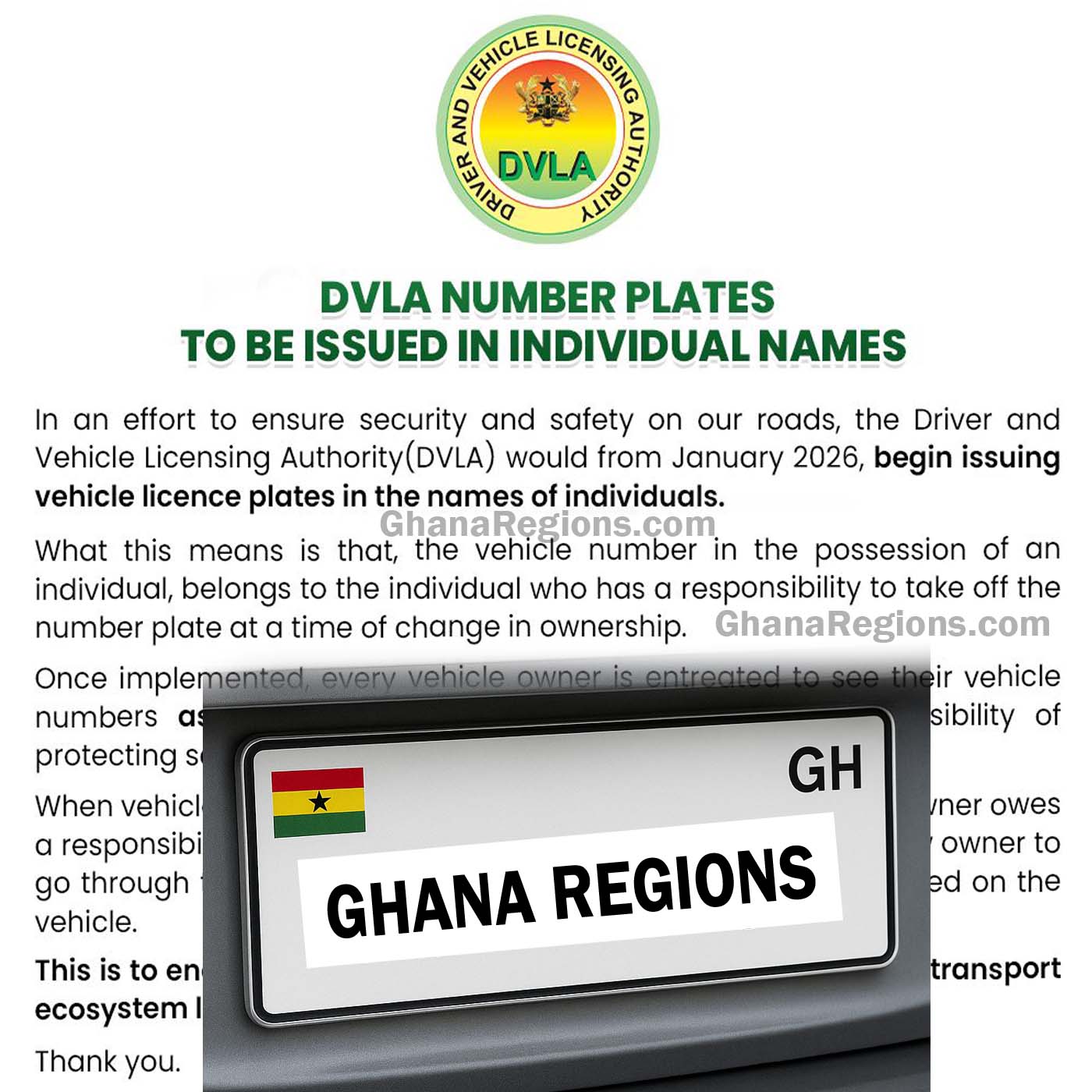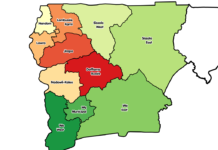
The Driver and Vehicle Licensing Authority (DVLA) has announced a major change to Ghana’s vehicle registration system: beginning 1 January 2026, vehicle license plates will be issued in the name of the individual owner rather than being tied permanently to the vehicle.
Under the new rule, the license plate becomes the owner’s property, the seller must remove their plate when transferring a vehicle, and the buyer must apply for a fresh plate in their own name.
According to GhanaRegions.com, the DVLA, the reform is intended to strengthen road safety, tighten security, and make it easier to trace vehicles used in crimes.
The Change — At a Glance
- What’s changing: Plates will be issued to persons, not to vehicles. Plates will become personal property.
- When it takes effect: From 1 January 2026.
- Immediate practical effect: When a vehicle is sold or transferred, the current owner must remove their plates; the new owner must register the vehicle and be issued a new plate in their own name.
Why the DVLA Says It’s Doing This
The DVLA has outlined several key reasons for this policy shift:
- Stronger traceability: Linking a plate directly to an individual makes it easier for law enforcement and security agencies to trace vehicles involved in crime, fraud, or hit-and-run incidents.
- Reducing fraudulent use of plates: The change will close loopholes that allow stolen or fraudulently registered vehicles to use plates that are hard to trace.
- Part of a wider plate redesign: The owner-linked plates will coincide with other 2026 changes, including the removal of the year of registration on plates and its replacement with zonal or area codes. The new design will display the region name at the top and an area code replacing the year.
How This Will Affect Vehicle Owners
Sellers
- Must remove their license plates at the point of sale.
- If they fail to do so, they risk having the plate still legally linked to them while a new owner uses the vehicle.
Buyers
- Will not inherit the seller’s plate.
- Must register the vehicle and obtain a new plate issued in their own name.
Used-Car Market
The long-standing practice where plates showing a recent registration year influence resale value will change. Since plates will no longer show the year, buyers and dealers will rely more on vehicle condition and documentation rather than plate coding.
Enforcement & Compliance
Police and other agencies will be able to link a registration plate directly to a person rather than a chain of previous vehicle owners, improving investigation efficiency.
What the DVLA Has and Hasn’t Clarified
Confirmed
- The policy of owner-linked plates.
- The effective date (January 2026).
- The obligation for sellers to remove plates upon sale.
Yet to Be Detailed
- The exact steps for plate removal and re-issue.
- Fees and penalties under the new system.
- How lost or stolen plates will be handled.
- Measures to prevent duplicate or fraudulent plates.
These details are expected to be outlined in upcoming DVLA operational guidelines and public notices.
Likely Short- and Medium-Term Effects
Short Term (First 3–6 Months):
- Increased inquiries and traffic at DVLA offices as the public adjusts.
- Possible delays as new systems and training roll out.
- Dealers and individuals will need new transfer procedures.
Medium Term (6–24 Months):
- Improved ability to trace vehicles involved in offences.
- Changes in vehicle resale practices, since plates will no longer indicate registration year.
Concerns and Questions
- Fees: Will there be new costs associated with transferring ownership or issuing personal plates?
- Lost or Stolen Plates: How will they be deactivated or replaced?
- Transition Rules: Will there be grace periods or special provisions for vehicles sold near the transition date?
- Operational Capacity: Can DVLA offices handle the surge in registrations without significant delays?
Comparison: Is Ghana Unique?
While several countries have systems linking plates to owners, Ghana’s model, making the plate personal property that must be removed when the vehicle changes hands, is notable. It represents a cultural and procedural shift in a market where plates traditionally stay with vehicles across multiple owners.
How to Prepare
- If selling a car before January 2026: Be prepared to remove your plate before handing over the vehicle.
- If buying a used car: Expect to register the vehicle and get your own plate immediately.
- Stay updated: Watch for official DVLA updates about fees and processes.
- Keep documentation: Retain all sale and registration receipts to avoid future disputes.
Bottom Line
The DVLA’s new owner-linked number plate system, set to begin on 1 January 2026, represents one of the most significant overhauls of Ghana’s vehicle registration framework in decades. By assigning plates to individuals instead of vehicles, the DVLA aims to improve accountability, traceability, and security on the nation’s roads.
While the reform promises greater transparency and control, it will also require major adjustments for car owners, dealers, and enforcement agencies. Vehicle owners are advised to stay informed and prepare early to ensure a smooth transition when the system takes effect.


















































![Morocco knock out Spain on 3-0 penalties to reach FIFA World Cup 2022 quarter-final, Morocco vs Spain (0-0) (3-0) [Video]. Morocco knock out Spain on 3-0 penalties](https://ghanaregions.com/wp-content/uploads/2022/12/Watch-Morocco-vs-Spain-0-0-and-3-0-penalties-218x150.jpg)


































